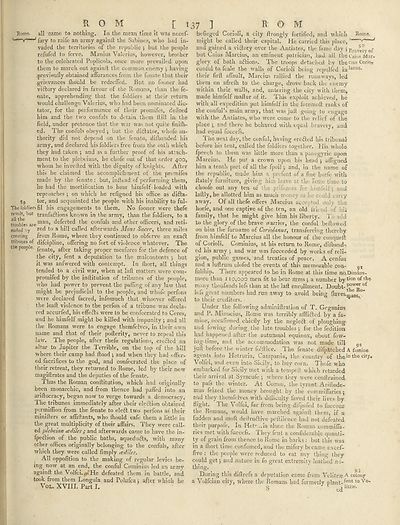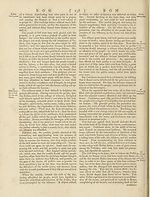Encyclopaedia Britannica, or, a Dictionary of arts, sciences, and miscellaneous literature : enlarged and improved. Illustrated with nearly six hundred engravings > Volume 18, RHI-SCR
(145) Page 137
Download files
Complete book:
Individual page:
Thumbnail gallery: Grid view | List view

H O M
Koms. all came to nothing. In the mean time it was necef-
fary to raife an army againft the Sabines, who had in¬
vaded the territories of the republic •, but the people
refufed to ferve. Manias Valerius, however, brother
to the celebrated Poplicola, once more prevailed upon
them to march out againtl the common enemy j having
previouily obtained ailurances from the fenate that their
.grievances Ihould be redreiled. But no fooner had
viftory declared in favour of the Romans, than the fe-
nate, apprehending that the foldiers at their return
would challenge Valerius, who had been nominated dic¬
tator, for the performance of their promifes, defired
him and the two confuls to detain them Hill in. the
field, under pretence that the war was not quite finifh-
ed. The confuls obeyed ; but the dictator, whofe au¬
thority did not depend on the fenate, difbanded his
army, and declared his foldiers free from the oath which
they had taken ; and as a further proof of his attach¬
ment to the plebeians, he cliofe out of that order 400,
whom he inveited with the dignity of knights. After
this he claimed the accompUthment of the promifes
made by the fenate : but, inftead of performing them,
he had the mortification to hear himfelf loaded with
reproaches *, on which he refigned his office as difta-
$9 tor, and acquainted the people with his inability to ful-
Thefoldiers fil his engagements to them. No fooner were thefe
revolt, but tranfaftions known in the army, than the foldiers, to a
troubles areraan> deferted the confuls and other officers, and reti-
ended by red to a hill called afterwards Mans Sacer, three miles
creating from Rome, where they continued to obferve an exa<R
tribunes of difeipline, offering no fort of violence whatever. The
t e people. fenajej after taking proper meafures for the defence of
the city, fent a deputation to the malcontents ; but
it was anfwered with contempt. In ffiort, all things
tended to a civil war, when at lafl: matters were com-
promifed by the inftitution of tribunes of the people,
who had power to prevent the palling of any law that
might be prejudicial to the people, and whofe perfons
were declared facred, infomuch that whoever offered
the leaft violence to the perfon of a tribune was decla¬
red accurfed, his effects were to be confecrated to Ceres,
and he himfelf might be killed with impunity ; and all
the Romans were to engage themfelves, in their own
name and that of their pofterity, never to repeal this
law. The people, after thefe regulations, eredted an
altar to Jupiter the Terrible, on the top of the hill
where their camp had flood •, and when they had offer¬
ed facrifices to the god, and confecrated the place of
their retreat, they returned to Rome, led by their new
magiftrates and the deputies of the fenate.
Thus the Roman conftitution, which had originally
Been monarchic, and from thence had paffed into an
ariftocracy, began now to verge towards a democracy.
The tribunes immediately after their eledfion obtained
permiffion from the fenate to eledl two perfons as their
minifters or affiftants, who fliould eafe them a little in
the great multiplicity of their affairs. They were call¬
ed plebeian cediles ; and afterwards came to have the in-
ipedlion of the public baths, aquedudls, with many
other offices originally belonging to the confuls, after
which they were called Amply cediles.
All oppofition to the making of regular levies be¬
ing now at an end, the conful Cominius led an army
againft the Volfci.^ He defeated them in battle, and
took from them Longula and Polufca; after which he
Vol. XVIII. Part I.
R 0 M
befieged Corioli, a city ftrongly fortified, and which Rome,
might be called their capital. He carried this place, 7 J
and gained a victory over the Antiates, the fame day j Bravery of
but Cains Marcius, an eminent patrician, had all the Caius Mar-
glory oi both adtions. The troops detached by the cius Corio-
conful to fcale the walls of Corioli being repulfed ialanus'
their firft affault, Marcius rallied the runaways, led
them on afrefti to the charge, drove back the enemy
within, their walls, and, entering the city with them,
made himfelf mailer of it. This exploit achieved, he
with, all expedition put himfelf in the foremoft ranks of
the conful’s main army, that was juft going to engage
with the Antiates, who were come to the relief of the
place and there he behaved with, equal bravery, and
had equal fuccefs.
The next day, the conful, having eredted his tribunal
before his tent, called the foldiers together. His whole-
fpeeeh to them was little more than a panegyric upon
Marcius. He put a crown upon his head ; affigned
him a tenth part of all the fpoil; and, in the name of
the republic, made him a prefent of a fine horfe with
ftately furniture, giving him leave at the lame time to
choofe out any ten of the priloners for himfelf; and
laftly, he allotted him as much money as he could carry
away. Of all thefe offers Mareius accepted only the
horfe, and one captive of the ten, an old friend of hu
family, that he might give him his liberty. To add
to the glory of the brave warrior, the conful bellowed
on him the furname of Conolnnus, transferring thereby
from himfelf to Marcius all the honour of the conqueft
of Corioli. Cominius, at his return to Rome, dilband-
ed his army ; and war was fucceeded by works of reli¬
gion, public games, and treaties of peace. A cenfus
and a luftruin clofed the events of this memorable con- <Jt
fulihip. There appeared to be in Rome at this time naDiminu-
mnre than 110,000 men fit to bear arms 5 a number bytl0n °f
many thoufands lefs than at the lall enrollment. Doubt- ot
lefs great numbers had run away to avoid being Havesmans^"
to their creditors. ^ v
Under the following adminillration of T. Geganius
and P. Minucius, Rome was terribly afflifled by a fa¬
mine, occafioned chiefly by the negledl of ploughing
and fowing during the late troubles ; for the fedition
had happened after the autumnal equinox, about fow-
ing-time, and the accommodation was not made till
juft before the winter lolftice. The fenate difpatched A famine
agents into Hetruria, Campania, the country of the in the city,
Vol lei, and even into Sicily, to buy corn. Thole who
embarked for Sicily met with a tempell which retarded
their arrival at Syracufe 5 where they were conftrained
to pais, the winter. At Cumaj, the tyrant Ariftode-
mus feized the money brought by the commiffaries ;
and they themfelves with difficulty laved their lives by
flight. The Volfci, far from being difpofed to fuccour
the Romans, would have marched againlt them, if a
hidden and moll deftruftive pellilence had not defeated
their purpoie. In Hetr..iia alone the Roman eommiffa-
ries met with fuccefs. They fent a confiderable quanti¬
ty of grain from thence to Rome in barks : but this was
in a fliort time confumed, and the mifery became excef-
five : the people were reduced to eat any thing they
could get 5 and nature in fo great extremity loathed nd-
thl'ng- ... 1 . ' 9.5
During this dillrefs a deputation came from Veil tree A colony
a Voffician city, where the Romans had formerly plant-lent t0 Ve"
s ediitne-
L 137 1
Koms. all came to nothing. In the mean time it was necef-
fary to raife an army againft the Sabines, who had in¬
vaded the territories of the republic •, but the people
refufed to ferve. Manias Valerius, however, brother
to the celebrated Poplicola, once more prevailed upon
them to march out againtl the common enemy j having
previouily obtained ailurances from the fenate that their
.grievances Ihould be redreiled. But no fooner had
viftory declared in favour of the Romans, than the fe-
nate, apprehending that the foldiers at their return
would challenge Valerius, who had been nominated dic¬
tator, for the performance of their promifes, defired
him and the two confuls to detain them Hill in. the
field, under pretence that the war was not quite finifh-
ed. The confuls obeyed ; but the dictator, whofe au¬
thority did not depend on the fenate, difbanded his
army, and declared his foldiers free from the oath which
they had taken ; and as a further proof of his attach¬
ment to the plebeians, he cliofe out of that order 400,
whom he inveited with the dignity of knights. After
this he claimed the accompUthment of the promifes
made by the fenate : but, inftead of performing them,
he had the mortification to hear himfelf loaded with
reproaches *, on which he refigned his office as difta-
$9 tor, and acquainted the people with his inability to ful-
Thefoldiers fil his engagements to them. No fooner were thefe
revolt, but tranfaftions known in the army, than the foldiers, to a
troubles areraan> deferted the confuls and other officers, and reti-
ended by red to a hill called afterwards Mans Sacer, three miles
creating from Rome, where they continued to obferve an exa<R
tribunes of difeipline, offering no fort of violence whatever. The
t e people. fenajej after taking proper meafures for the defence of
the city, fent a deputation to the malcontents ; but
it was anfwered with contempt. In ffiort, all things
tended to a civil war, when at lafl: matters were com-
promifed by the inftitution of tribunes of the people,
who had power to prevent the palling of any law that
might be prejudicial to the people, and whofe perfons
were declared facred, infomuch that whoever offered
the leaft violence to the perfon of a tribune was decla¬
red accurfed, his effects were to be confecrated to Ceres,
and he himfelf might be killed with impunity ; and all
the Romans were to engage themfelves, in their own
name and that of their pofterity, never to repeal this
law. The people, after thefe regulations, eredted an
altar to Jupiter the Terrible, on the top of the hill
where their camp had flood •, and when they had offer¬
ed facrifices to the god, and confecrated the place of
their retreat, they returned to Rome, led by their new
magiftrates and the deputies of the fenate.
Thus the Roman conftitution, which had originally
Been monarchic, and from thence had paffed into an
ariftocracy, began now to verge towards a democracy.
The tribunes immediately after their eledfion obtained
permiffion from the fenate to eledl two perfons as their
minifters or affiftants, who fliould eafe them a little in
the great multiplicity of their affairs. They were call¬
ed plebeian cediles ; and afterwards came to have the in-
ipedlion of the public baths, aquedudls, with many
other offices originally belonging to the confuls, after
which they were called Amply cediles.
All oppofition to the making of regular levies be¬
ing now at an end, the conful Cominius led an army
againft the Volfci.^ He defeated them in battle, and
took from them Longula and Polufca; after which he
Vol. XVIII. Part I.
R 0 M
befieged Corioli, a city ftrongly fortified, and which Rome,
might be called their capital. He carried this place, 7 J
and gained a victory over the Antiates, the fame day j Bravery of
but Cains Marcius, an eminent patrician, had all the Caius Mar-
glory oi both adtions. The troops detached by the cius Corio-
conful to fcale the walls of Corioli being repulfed ialanus'
their firft affault, Marcius rallied the runaways, led
them on afrefti to the charge, drove back the enemy
within, their walls, and, entering the city with them,
made himfelf mailer of it. This exploit achieved, he
with, all expedition put himfelf in the foremoft ranks of
the conful’s main army, that was juft going to engage
with the Antiates, who were come to the relief of the
place and there he behaved with, equal bravery, and
had equal fuccefs.
The next day, the conful, having eredted his tribunal
before his tent, called the foldiers together. His whole-
fpeeeh to them was little more than a panegyric upon
Marcius. He put a crown upon his head ; affigned
him a tenth part of all the fpoil; and, in the name of
the republic, made him a prefent of a fine horfe with
ftately furniture, giving him leave at the lame time to
choofe out any ten of the priloners for himfelf; and
laftly, he allotted him as much money as he could carry
away. Of all thefe offers Mareius accepted only the
horfe, and one captive of the ten, an old friend of hu
family, that he might give him his liberty. To add
to the glory of the brave warrior, the conful bellowed
on him the furname of Conolnnus, transferring thereby
from himfelf to Marcius all the honour of the conqueft
of Corioli. Cominius, at his return to Rome, dilband-
ed his army ; and war was fucceeded by works of reli¬
gion, public games, and treaties of peace. A cenfus
and a luftruin clofed the events of this memorable con- <Jt
fulihip. There appeared to be in Rome at this time naDiminu-
mnre than 110,000 men fit to bear arms 5 a number bytl0n °f
many thoufands lefs than at the lall enrollment. Doubt- ot
lefs great numbers had run away to avoid being Havesmans^"
to their creditors. ^ v
Under the following adminillration of T. Geganius
and P. Minucius, Rome was terribly afflifled by a fa¬
mine, occafioned chiefly by the negledl of ploughing
and fowing during the late troubles ; for the fedition
had happened after the autumnal equinox, about fow-
ing-time, and the accommodation was not made till
juft before the winter lolftice. The fenate difpatched A famine
agents into Hetruria, Campania, the country of the in the city,
Vol lei, and even into Sicily, to buy corn. Thole who
embarked for Sicily met with a tempell which retarded
their arrival at Syracufe 5 where they were conftrained
to pais, the winter. At Cumaj, the tyrant Ariftode-
mus feized the money brought by the commiffaries ;
and they themfelves with difficulty laved their lives by
flight. The Volfci, far from being difpofed to fuccour
the Romans, would have marched againlt them, if a
hidden and moll deftruftive pellilence had not defeated
their purpoie. In Hetr..iia alone the Roman eommiffa-
ries met with fuccefs. They fent a confiderable quanti¬
ty of grain from thence to Rome in barks : but this was
in a fliort time confumed, and the mifery became excef-
five : the people were reduced to eat any thing they
could get 5 and nature in fo great extremity loathed nd-
thl'ng- ... 1 . ' 9.5
During this dillrefs a deputation came from Veil tree A colony
a Voffician city, where the Romans had formerly plant-lent t0 Ve"
s ediitne-
L 137 1
Set display mode to:
![]() Universal Viewer |
Universal Viewer | ![]() Mirador |
Large image | Transcription
Mirador |
Large image | Transcription
Images and transcriptions on this page, including medium image downloads, may be used under the Creative Commons Attribution 4.0 International Licence unless otherwise stated. ![]()
| Permanent URL | https://digital.nls.uk/193020592 |
|---|
| Attribution and copyright: |
|
|---|
| Description | Ten editions of 'Encyclopaedia Britannica', issued from 1768-1903, in 231 volumes. Originally issued in 100 weekly parts (3 volumes) between 1768 and 1771 by publishers: Colin Macfarquhar and Andrew Bell (Edinburgh); editor: William Smellie: engraver: Andrew Bell. Expanded editions in the 19th century featured more volumes and contributions from leading experts in their fields. Managed and published in Edinburgh up to the 9th edition (25 volumes, from 1875-1889); the 10th edition (1902-1903) re-issued the 9th edition, with 11 supplementary volumes. |
|---|---|
| Additional NLS resources: |
|

